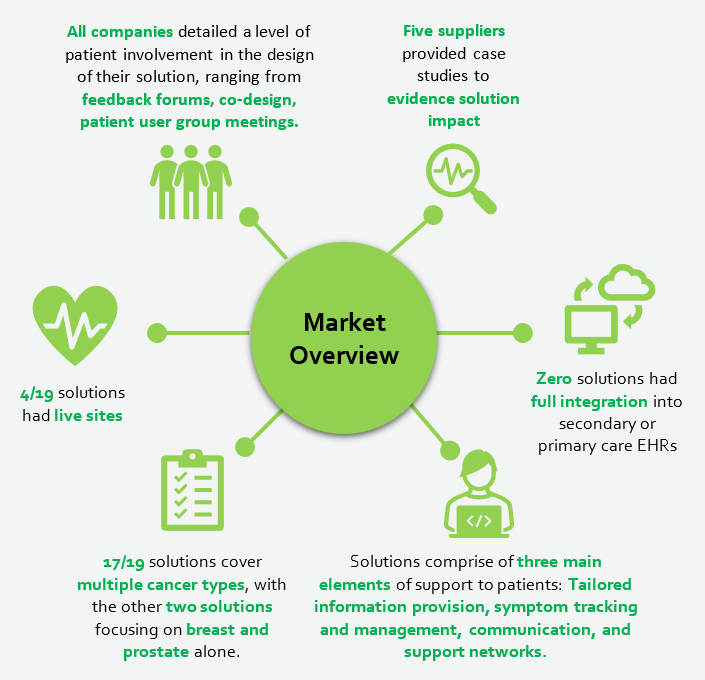South East London Cancer Alliance: understanding the personalised care market
December 19, 2022
The NHS Long Term Plan states that every person with cancer should have access to health and wellbeing information and support before, during and after their treatment, making up one of the four personalised care interventions within the Plan. Information should be accessible and include advice on emotional support, coping with side effects, financial advice, getting back to work and making healthy lifestyle choices.
Covid-19 severely impacted the delivery of previously run face to face health and wellbeing events for people living with cancer. The South East London Cancer Alliance (SELCA) is committed to supporting the system through the provision of a multimodal health and wellbeing offer, which includes a digital component.
To help clarify this digital component, SELCA and the three other London based Cancer Alliances sought to understand the market for personalised care platforms applicable to cancer, enabling person centred decision making and improving patient management for clinicians. The focus for SELCA was to identify platforms that have the capability to provide tailored health and wellbeing support resources and information and integrate with clinical systems such as EPRs or the Macmillan Electronic Holistic Needs assessment platform.
SELCA’s aspiration was to offer patients an accessible platform that provided personalised information and care advice, including nudge reminders, to engage patients in self-management activities and support health and wellbeing behaviour change which would deliver better outcomes. It was believed that patient engagement would be increased through a platform’s ability to integrate with cancer services’ oncology patient records and processes and use this data alongside data entered by patient on the platform to effectively tailor responses and content to the individual.
The work had three core purposes:
Consolidate market information
Enable clinical and project staff to navigate the market and better manage engagements with companies that approach them.
Assess the current market
Identify and compare solutions that deliver personalised care in the context of cancer services. This work explored the capabilities and commercial offerings of platforms and standalone solutions (e.g. apps) which supported service delivery and patient self-management.
Inform future personalised care module development
Conduct market engagement and explore the adoption of similar technologies in other parts of the health system, ensuring proposed solutions were fit for purpose.
Project approach

Project brief
Project brief defined with SELCA

Define inclusion criteria
Inclusion criteria agreed and used to define parameters of scope for the research carried out.

Desktop research
Desktop research carried out, identifying solutions which met the majority of the inclusion criteria set.

Engagement with NHS/AHSN system
Engagement with researchers/NHS providers active in this area of work to gain relevant insights on transferable practice and solutions currently in use. London Cancer Alliances were asked to submit a list of solutions they had knowledge of and were interested to gain further information on.

Shortlist suppliers against inclusion criteria
Suppliers were shortlisted against the inclusion criteria based on information found online and through engagement with the SELCA team to understand priorities (setting information provision as the key criteria)

Explore and review solutions
Functionality and appropriateness were explored through interviews with suppliers as well as follow-up emails for clarifications.
Market overview

Summary of recommendations
Recommendations have been categorised into provider, system, and patient perspectives to provide insights specific to these key stakeholders. The main recommendations from each perspective are as follows:
Providers: The evidence for use of personalised care support platforms in cancer services is currently limited, and therefore health care organisations should look to pilot solutions at a local level to understand the benefits. Benefits realisation will be particularly useful to identify the impact the solutions are able to provide for local populations, and the demographics and digital capabilities therein – providing understanding as to the types of patients who benefit from these platforms and the digital capabilities that people need to have to access and benefit from them. Providers should look to negotiate pilot contracts at subsidised cost with suppliers before procuring any solution. There are multiple interoperability factors to take into consideration, and solutions that can integrate with multiple clinical and patient facing platforms and devices (such as wearables, Macmillan’s eHNA) would be favourable.
System: Procurement of this type of solution helps systems to deliver against elements of the NHS Long Term Plan including: offering digital access to all patients; providing every person with cancer access to health and wellbeing support and information before, during, and after their treatment; and supporting self-management, (which is one of NHS England’s six core components of personalised care). Sharing costs or running joint procurements across organisations such as cancer alliances or Integrated Care Boards (ICBs) could deliver savings through economies of scale. A population based commercial model offers the opportunity to spread a common solution for all patients and staff within a system. Adoption of these solutions in their early stage of maturity presents an opportunity for systems to define for suppliers what is needed to ensure their products provide optimum experience and outcomes.
Patients: Given the premise of personalised care, apps that are developed with patient input are highly favoured. A patient led approach to piloting and adopting a solution could be taken at both a provider and system level. Training for patients should be offered to optimise compliance and use of these solutions.
“The HIN’s Digital Transformation and Technology team were easy to work with, taking a collaborative approach to shape the project, set objectives and realise our vision for the market review. They were able to engage the market and build relationships to draw out an indepth analysis of the individual products. They utilised their expert knowledge to produce a clear evaluation which will be useful in our work going forward. They remained communicative throughout the project so that we felt involved every step of the way, and have helped us to make connections with companies to explore future beneficial partnerships”
Samantha Tordesillas, Programme Manager for Personalised Cancer Care, South East London Cancer Alliance
Need support with a market review?
The HIN’s Digital Transformation and Technology team have extensive experience in producing market reviews for the healthcare sector, including public health, secondary and primary care.
